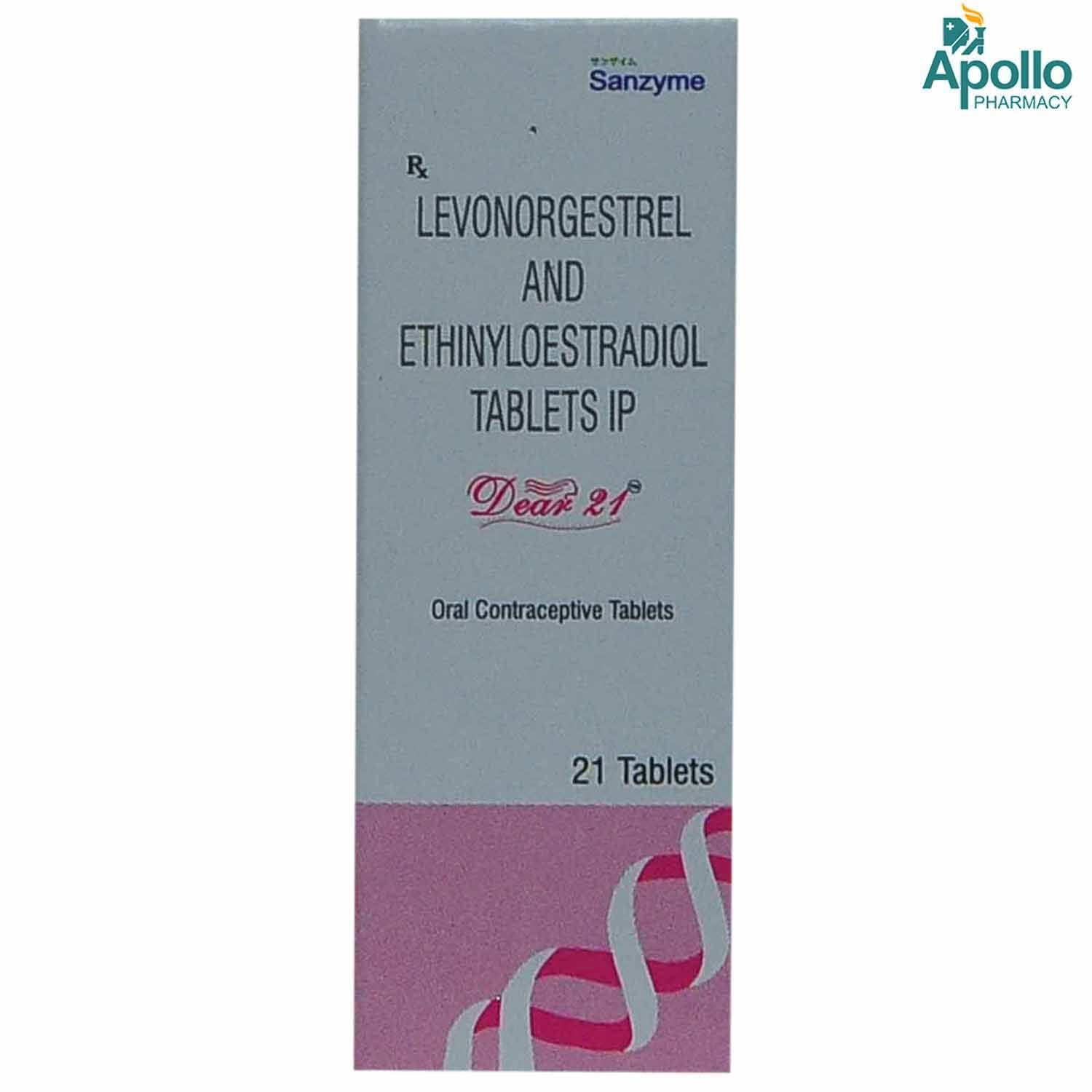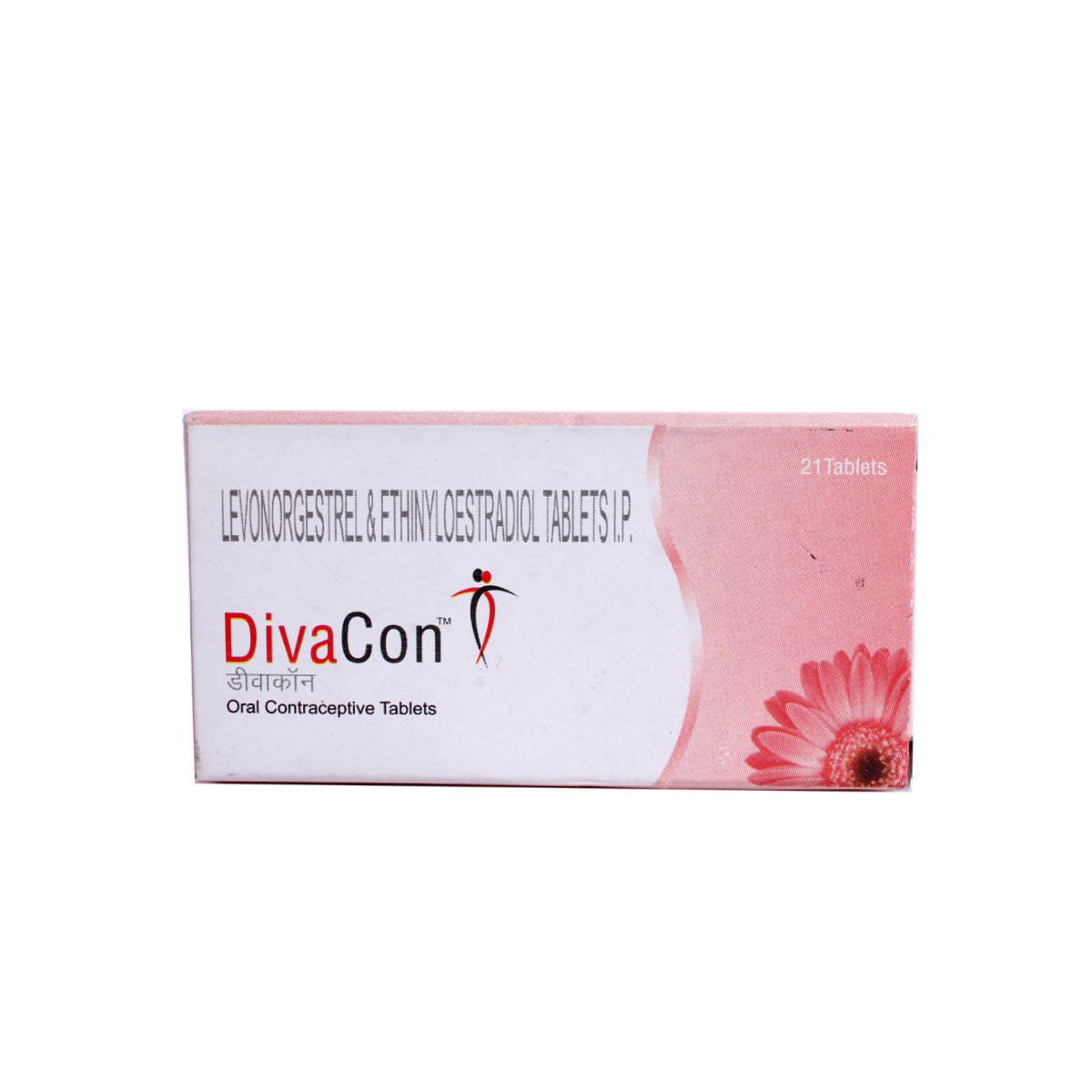Ethinylestradiol+levonorgestrel
About Ethinylestradiol+levonorgestrel
Ethinylestradiol+levonorgestrel belongs to a group of medications called 'hormonal contraceptives' primarily used for contraception and treating dysmenorrhea (irregular and painful periods). Contraception is a procedure that aims to prevent unwanted pregnancy for safe family planning. Dysmenorrhea is an irregular and painful menstrual period leading to abdominal pain, mood swings, digestion problems, fainting, vomiting, and nausea.
Ethinylestradiol+levonorgestrel is a combination of two medications: Ethinylestradiol and Levonorgestrel. Ethinylestradiol is a synthetic female hormone (estrogen) that maintains a normal menstrual cycle (periods) in women. It works by fulfilling the deficiency of estrogen hormone, thereby preventing symptoms like night sweats, hot flushes, and mood swings. Levonorgestrel is a progestin (female sex hormones) that prevents the release of an egg from the ovary (female reproductive cells) or prevents fertilization of an egg by sperm (male reproductive cells). Ethinylestradiol+levonorgestrel may also change the lining of the uterus to prevent the development of a pregnancy. Thus together, Ethinylestradiol+levonorgestrel helps prevents pregnancy.
Take Ethinylestradiol+levonorgestrel as prescribed by your doctor. Ethinylestradiol+levonorgestrel can be taken with or without food but take it simultaneously every day for best results. Depending on your medical condition, you are advised to take Ethinylestradiol+levonorgestrel for as long as your doctor has prescribed it for you. You may experience stomach pain, headache, nausea, breast pain, weight gain, and irregular uterine bleeding. Most of these side effects of Ethinylestradiol+levonorgestrel do not require medical attention and gradually resolve over time. However, if the side effects are persistent, reach out to your doctor. Do not use Ethinylestradiol+levonorgestrel if you are pregnant or have recently delivered a baby.
Inform your doctor before starting to Ethinylestradiol+levonorgestrel if you are over 35 years or ever have a heart problem, cancer (breast, uterus, or vagina), uterine bleeding, liver, or kidney problems. Do not take Ethinylestradiol+levonorgestrel if you are pregnant already or a breastfeeding mother. Ethinylestradiol+levonorgestrel does not prevent the transmission of any sexually transmitted disease (STD), so use some other form of contraception (condom) during sexual intercourse if you have any STD or AIDS (acquired immunodeficiency syndrome).
Uses of Ethinylestradiol+levonorgestrel
Medicinal Benefits
Ethinylestradiol+levonorgestrel is an oral hormonal combination drug, Ethinylestradiol and Levonorgestrel, primarily used for contraception. Ethinylestradiol+levonorgestrel contains two female sex hormones, progestin (levonorgestrel) and estrogen (ethinylestradiol), which help prevent pregnancy in multiple ways. It prevents the release of an egg from the ovaries and makes the fluid present in the cervix difficult for sperm to enter the womb. In addition, it prevents the thickening of the uterus's inner wall, which is necessary for an egg to grow and multiply. Ethinylestradiol+levonorgestrel is generally taken for 21 days starting from day one of the menstrual cycle, and then for the next seven days, it is not taken, and the same course is repeated.
Directions for Use
Storage
Side Effects of Ethinylestradiol+levonorgestrel
- Headache
- Weight gain
- Acne (pimples)
- Stomach pain/cramps
- Tiredness
- Depression
Drug Warnings
Please inform your doctor if you have ever had heart disease, hypertension, obesity, cancer (breast, cervix, or uterus), diabetes mellitus, liver or kidney disease, or abnormal uterine bleeding as Ethinylestradiol+levonorgestrel is known to contra-indicate. Check your breast every month for changes, such as if you feel lumps or see anything odd, please inform your doctor. Smoking may increase the risk of cardiovascular disease in women over 35 years when taking Ethinylestradiol+levonorgestrel. Ethinylestradiol+levonorgestrel does not protect against any sexually transmitted disease or HIV. If pregnancy occurs while you are taking Ethinylestradiol+levonorgestrel, please consult your doctor. Do not start using a new medication without telling your doctor. Sometimes, you may experience spotting or bleeding in between missed periods or menstrual periods. If the spotting persists, please consult your doctor. Do not use Ethinylestradiol+levonorgestrel if you are pregnant or have recently delivered a baby. If you have missed a dose or are late by 12 hours, please wear a condom for two days while sexual intercourse to avoid unwanted pregnancy. Do not take medicine if you are pregnant already or breastfeeding. If you have migraines, please inform your doctor, as taking Ethinylestradiol+levonorgestrel may increase your headache.
Drug Interactions
Drug-drug interactions: Ethinylestradiol+levonorgestrel may have an interaction with anti-epilepsy medicines (primidone, phenytoin, carbamazepine), medications used to treat tuberculosis (rifampicin, rifabutin), drugs used to treat HIV (ritonavir, efavirenz, paritaprevir) medicine used to treat fungal infections (griseofulvin, ketoconazole, itraconazole, posaconazole).
Drug-Food Interactions: Ethinylestradiol+levonorgestrel interacts with St. John's wort (an antidepressant herbal supplement). Also, alcohol consumption and grapefruit juice should not be included with the Ethinylestradiol+levonorgestrel.
Drug-Disease Interactions: Inform your doctor if you smoke, have or have ever had liver or kidney disease, heart disease, hypertension, diabetes mellitus, liver disease, abnormal uterine bleeding, breast, cervix, uterus cancer, or anaemia.
Drug-Drug Interactions Checker List:
Safety Advice

Alcohol
unsafeYou are recommended not to consume alcohol along with Ethinylestradiol+levonorgestrel to avoid unpleasant side effects.

Pregnancy
unsafeCaution should be exercised. Hormonal medicines can affect the developing baby. It is advisable to consult a doctor before using it.

Breast Feeding
unsafeNot safe; this Ethinylestradiol+levonorgestrel may pass into breast milk. They may harm the baby and also may affect the production of milk. So, this Ethinylestradiol+levonorgestrel is unsafe for breastfeeding mothers.

Driving
cautionEthinylestradiol+levonorgestrel has no or negligible influence on the ability to drive or use machines.

Liver
cautionEthinylestradiol+levonorgestrel to be taken with caution, especially if you have a history of Liver diseases/conditions. The dose may have to be adjusted by your doctor.

Kidney
cautionEthinylestradiol+levonorgestrel to be taken with caution, especially if you have a history of Kidney diseases/conditions. The dose may have to be adjusted by your doctor.

Children
cautionEthinylestradiol+levonorgestrel is not recommended for children. Safety and efficacy of Ethinylestradiol+levonorgestrel are established in women of reproductive age. But sufficient studies have not been performed on women less than 16 years of age. So, take Ethinylestradiol+levonorgestrel only when prescribed by a doctor.
Habit Forming
Diet & Lifestyle Advise
- Keep your weight under control with a body mass index (BMI) of 19.5-24.9.
- Opt for a diet rich in whole grains, fruits, veggies, and low-fat dairy products.
- Including heart-healthy omega-3 fatty acid-containing food drinks in your daily diet. You can also use low-fat cooking oil like olive oil, soybean oil, canola oil, and coconut oil to lower your elevated blood pressure.
- Do regular exercise to maintain weight fluctuations caused due to Ethinylestradiol+levonorgestrel.
- Avoid chronic stress and exercise like running, as it might increase vaginal bleeding.
- Monitor your blood pressure daily and if there is too much fluctuation, immediately contact your doctor.
- Monitor your blood sugar level and blood pressure regularly to avoid any complications.
- Quitting smoking and not drinking alcohol is the best strategy to lower the risk of any complications.
Special Advise
- Stop taking this Ethinylestradiol+levonorgestrel and inform your doctor immediately if you notice unexplained pain and swelling in your limbs, chest pain, shortness of breath, severe headache, or changes in vision. These could be symptoms of a blood clot in a vein.
Patients Concern
Disease/Condition Glossary
Contraception: It is a procedure that aims to prevent pregnancy. A woman can only get pregnant if a man's sperm fertilizes her egg. Contraception aims to prevent this from happening by keeping egg and sperm apart by stopping egg production or not letting the uterus wall become thick. As a result, no fertilization takes place, so contraception is a safe method for family planning.
Dysmenorrhea: It is an irregular and painful period leading to abdominal pain, digestion problems, fainting, vomiting, and nausea. Generally, a menstrual cycle is about 25-30 days. But this cycle may be short or prolonged in dysmenorrhea, leading to excessive pain.
FAQs
Yes, Ethinylestradiol+levonorgestrel can cause spotting in between the regular periods. Usually, it does not persist, but if spotting does not, please inform your doctor, as medical attention may be required.
Yes, Ethinylestradiol+levonorgestrel is known to cause weight gain. So, avoid weight gain, exercise regularly, and eat home-cooked food.
No, the Ethinylestradiol+levonorgestrel does not protect against sexually transmitted diseases (STDs). It is an oral form of contraception that does not protect against STDs. So, use some other form of contraception, like condoms, to avoid transmission.
You will usually get your period within three days after taking the last pill. If you have not followed the dosing schedule like you have missed one or two pills or started taking them a day after, you should have the probability of pregnancy at the time of the first missed period, and you should contact your doctor.
Do not take Ethinylestradiol+levonorgestrel if you have a heart fitted with an artificial valve, heart diseases like high blood pressure or high blood cholesterol levels (increased fat in your blood), confirmed or suspected ectopic pregnancy, have asthma, have blood clot problems, have a bleeding disorder, have liver or kidney disease, have anaemia (low haemoglobin) or otherwise malnourished. Taking Ethinylestradiol+levonorgestrel in these conditions can cause life-threatening conditions in an individual.
If you forget to take one tablet of Ethinylestradiol+levonorgestrel, take it as soon as you remember, even if it means taking two tablets at the same time and then follow the usual dosing schedule. However, if you forget to take two or more doses, you may not be completely protected against pregnancy. In this case, start taking the Ethinylestradiol+levonorgestrel as soon as you remember and use a non-hormonal method of contraception such as condoms for at least the next 7 days to prevent pregnancy. Frequent missing doses may cause spotting (bloodstain) or unexpected vaginal bleeding. If this persists, contact your doctor.
Ethinylestradiol+levonorgestrel is contraindicated in women with a history of breast and cervical cancer. Women with known or suspected carcinoma of the breast or personal history of breast cancer should not use Ethinylestradiol+levonorgestrel because breast cancer is usually a hormonally-sensitive tumor, and Ethinylestradiol+levonorgestrel slightly increases your risk of breast cancer.Therefore, inform your doctor if you have had a history of breast cancer before taking Ethinylestradiol+levonorgestrel.







